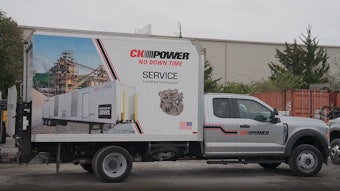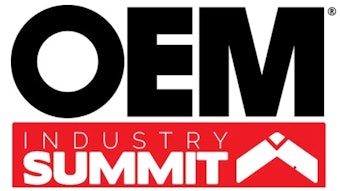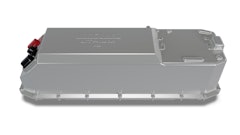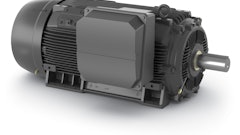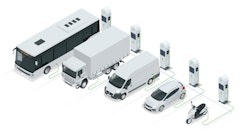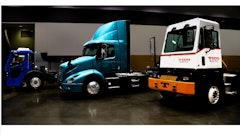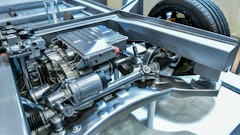
At bauma 2025, Perkins will exhibit an expanded lineup of power systems, services and technologies that enable OEMs to build machines engineered for efficiency, productivity and fuel flexibility.
Perkins is showing a range of new:
• Fuel-flexible optimized internal combustion engines.
• Hybrid solutions to optimize efficiency.
• Alternative fuel power systems to deliver long-term flexibility for the user.
• Electrification offerings for zero-exhaust emissions.
• Digital services to connect and provide condition monitoring data to customers.
• And life cycle solutions to keep engines operating at their optimum productivity.
New optimized and fuel flexible 2600 Series and 106 kW 904 Series
Available in 2026, the Perkins 2600 Series engine platform is designed to meet the demands of construction and many other off-road, heavy-duty applications. The new 13-litre diesel engine platform achieves best-in-class power density, torque, fuel efficiency and productivity and extends Perkins’ leadership in high-performing, mid-sized engines with eight power ratings from 340 to 515 kW (456 to 690 hp) offering up to 3,200 Nm of peak torque. Industrial open power units configured with engine-mounted after-treatment and cooling packs will also be available to reduce installation and validation costs for OEMs.
The 2600 Series will meet the emissions standards of highly regulated territories, such as EU Stage V, U.S. EPA Tier 4 Final, China Nonroad Stage IV, Korea Stage V, and Japan 2014, with models available for less regulated territories.
By modularizing and eliminating components, its architecture is space-protected to accommodate configuration adjustments anticipated for future tiers of emission standards in the U.S. and EU without relocating customer connection points. The 2600 Series engine platform also enables the use of renewable liquid fuels such as 100% hydrotreated vegetable oil (HVO), up to B20 for models with aftertreatment and B100 for models without aftertreatment1.
The Perkins stand also features the new 106 kW variant of the 904 Series platform. With a 6% power uplift from the 100-kW model, and a 3% increase in torque, the new offering is ideally suited to applications that need more power in a compact package. The standard offering from the factory also comes with EMAT aftertreatment to minimize installation costs for the OEM.
The Perkins 904J-E36TA has been fitted with a new 12-plate oil cooler to improve the durability and reliability of the engine, while high efficiency fuel filters improve altitude capability. The engine meets EU Stage V, U.S. EPA Tier 4 Final and Japan 2014 emissions standards. The 904 Series engines can be run on a wide range of fuels, subject to the fuel used meeting Perkins’ fuel specifications, including 100% HVO.
Connectivity and condition monitoring: a new era in equipment management
Perkins developed a comprehensive connectivity and condition monitoring solution to meet customers’ requirements and deliver measurable benefits to OEMs and operators.
A telematics data sharing application programming interface (API) is available for OEMs to share engine data from pre-existing OEM telematics systems, supporting equipment owners with enriched advanced analytics from the engine, supported by condition monitoring and insights that are sent to the customer’s engine support ecosystem.
Prioritizing parts and service
Perkins’ booth features an interactive display on the benefits of register, maintain, extend, and replace. Together, these four actions optimize engine performance throughout its entire life cycle.
Perkins debuts battery electric power unit at bauma 2025
Perkins welcomes the addition of a new battery electric power unit technical demonstrator. Shown in a pipe fusion machine, the plug-and-play battery electric power unit is designed to enable off-highway OEMs to seamlessly transition from diesel to a battery electric powertrain.
Configurable hybrid power systems
Project Coeus sees Perkins partner with Equipmake and Loughborough University’s Wolfson School of Mechanical, Electrical and Manufacturing Engineering to develop an innovative, advanced configurable-fuel drop-in hybrid power unit, as a direct replacement for a diesel engine.
The four fuels selected for inclusion in Project Coeus – ethanol, methanol, bio-methane and hydrogen – have one characteristic in common: they are all spark-ignited fuels, to create the common configurable combustion platform on which the project relies.
The first phase of the project is the development of a 180-280 kW hybrid power system, to deliver a robust and trusted fuel configurable plug and play solution that produces a consistent power performance, regardless of the fuel type, ensuring long-term flexibility for the user.

